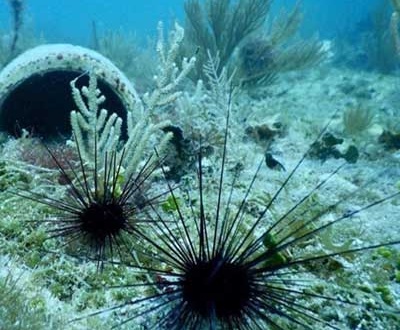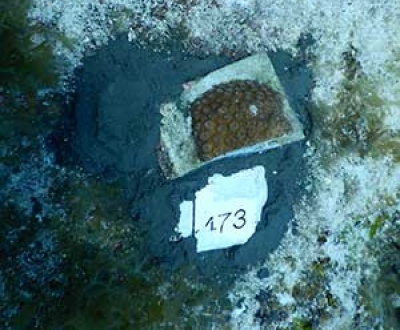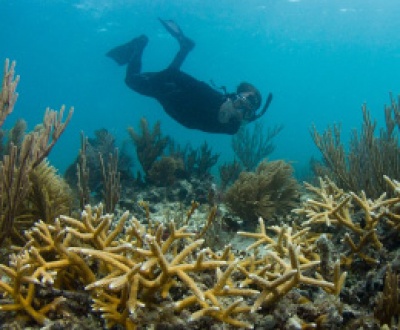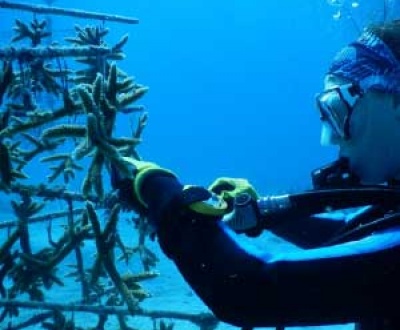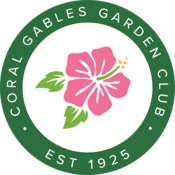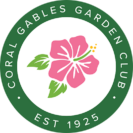Citizen Science: Community Members Help to “Rescue a Reef”
- December 20, 2021
- Dalton Hesley
Ever dream of being a marine biologist? Well, the University of Miami (UM) Rosenstiel School’s “Rescue a Reef” program is a citizen science project that offers everyday individuals the opportunity to be marine scientists for an afternoon, working to restore our local coral reefs! Community members team up with coral scientists for an offshore expedition where divers and snorkelers help transplant threatened corals and rebuild reef habitat. Pretty neat, huh? This citizen science project is powered by UM’s coral gardening and reef restoration research lab which you can learn more about in our previous segments in The Hothouse Blog: Chapter 1, Chapter 2, and Chapter 3!
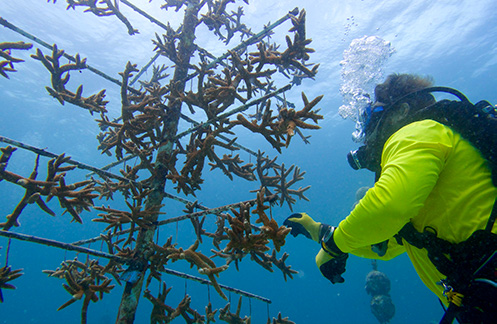
A citizen scientist helping to maintain a “coral tree” in the underwater nursery.
Let’s take a small step back though… what exactly is “citizen science”? Citizen science refers to any research or scientific activity that is conducted by non-professionals (i.e., the general public) in cooperation with trained scientists so as to both advance the research project and engage individuals in the sciences. It is a platform for scientists to utilize people-power and drive a research project forward while educating them on the topic. And an opportunity for curious or concerned citizens to contribute to an effort or initiative they are passionate about!
This means citizen science can come in many different shapes and sizes! Community members can help scientists with project monitoring, data collection, sampling, analysis, reporting, and anything in-between. And the citizen science project can be focused on pretty much anything; bird populations, outer space, plastic pollution, invasive species, orchid propagation, or even coral reef restoration! The project can be specific to a small community or cover the globe. It can harness the power of a handful of people or the masses. Citizen science offers any individual of any age and background the opportunity to learn and contribute to any project they are interested in. This can bring science and society closer creating a “scientific citizenship” where individuals are more engaged in environmental issues and scientists are able to make discoveries that would not otherwise be possible!
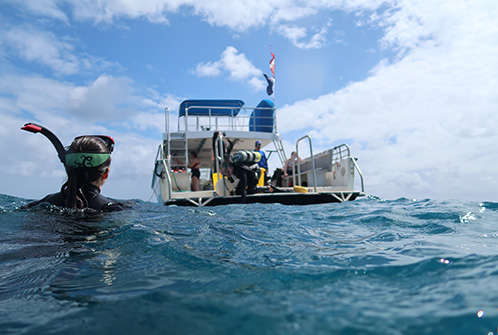
A citizen scientist on a “Rescue a Reef” expedition.
Citizen scientists have been contributing to land-based scientific projects for centuries. But there has been an increasing number of projects developed for marine-based research too! Enter, “Rescue a Reef”…
Rescue a Reef (RAR) is UM’s citizen science project designed to build both community and coastal resilience through public participation in coral reef restoration. The program was launched by Dr. Diego Lirman in 2015 to advance the recovery of depleted coral populations by providing educational, experiential opportunities to community members interested in learning about, and contributing to, the conservation of our coral reefs.
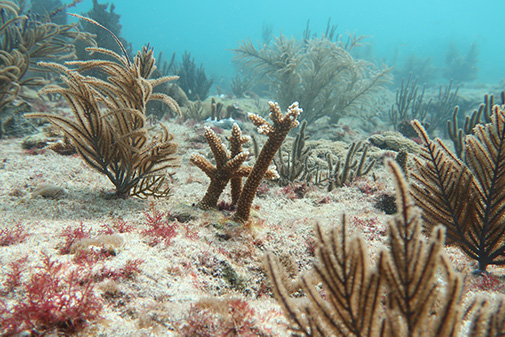
Newly outplanted staghorn corals during a “Rescue a Reef” expedition.
The foundation of RAR is its citizen science expeditions! These public field expeditions are led by UM coral researchers and provide a unique, hands-on opportunity for recreational SCUBA divers and snorkelers to participate directly in coral reef research and restoration activities. Citizen scientists receive a short training on coral gardening and restoration techniques before heading offshore to help maintain the coral nursery, monitor the reef, and outplant coral colonies. To date, hundreds of RAR participants have helped transplant thousands of corals to local reefs! By restoring coral populations and rebuilding reef structure, they are reinforcing the crucial ecosystem services – such as fisheries habitat, shoreline protection, and recreation – which these corals and reefs provide to coastal communities! And our exit surveys have shown that by doing this work, the participants become more knowledgeable on the subjects and confident in their ability to act as stewards for our oceans.
As the world’s environmental issues become more complex and concerning, they will require greater social awareness and action to solve. Our RAR program has shown to have success on this front! Through these education and citizen science activities, participants learn about the critical roles of coral reefs, ongoing threats they face, and tools available for their restoration; all while conducting real-world coral reef research. Dive in to “Rescue a Reef” or find another citizen science project in your area today!
Dalton Hesley, M.P.S., M.S.Ed.
Senior Research Associate III
University of Miami Rosenstiel School
Email: djh43@miami.edu
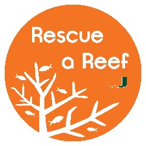
Rescue A Reef Program: rescueareef.rsmas.miami.edu
Facebook: https://www.
Twitter: https://twitter.com/
Instagram: https://www.
About the Author

Dalton Hesley
Dalton Hesley is a Sr. Research Associate in Dr. Diego Lirman's Coral Restoration Lab at the University of Miami Rosenstiel School where he studies the relationship between coral reefs and coastal communities.
He received his Master of Professional Science degree in 2015 and Master of Science in Education degree in 2021 from the University of Miami with focuses on citizen science and community psychology. In addition to working as a research associate, Dalton manages Rescue a Reef, the lab’s citizen science program designed to advance coral reef conservation through education, outreach, and public participation.
As a Minnesota native, Dalton hopes to help restore the future of coral reefs so generations to come can experience their wonder.
Sign up here for email notifications about new Hothouse Blog articles!
More articles on the subject
See all posts
Recent Posts
- April 2023 April 1, 2024
- Good News on Environmental Plastics February 1, 2024
- Material World / Plant World January 1, 2024
Leave a Comment cancel
This site uses Akismet to reduce spam. Learn how your comment data is processed.



